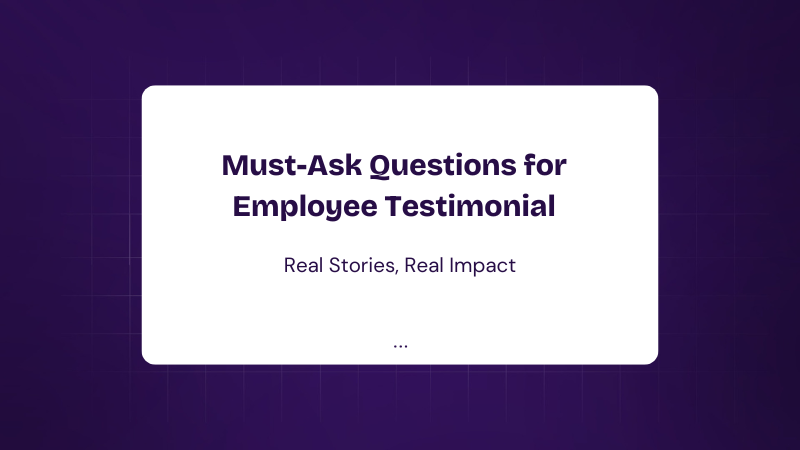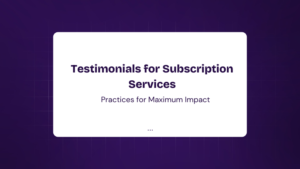Why Employee Testimonials Are the Secret Sauce of Employer Branding
Imagine scrolling through a company’s career page and finding nothing but corporate jargon, stock photos of overly enthusiastic people high-fiving, and generic promises about a “great work culture.” Not very convincing, right?
Now, picture an employee testimonial—genuine, unscripted, and filled with personal experiences that paint an authentic picture of what it’s really like to work there. Which one feels more persuasive?
Research shows that 92% of job seekers consider employee testimonials a crucial factor in evaluating a company, according to a Glassdoor study. Authentic employee stories build trust, boost credibility, and influence hiring decisions. But here’s the catch—badly structured testimonials can feel robotic and forced.
So, how do you get meaningful, compelling responses? By asking the right questions. Let’s explore the top 5 employee testimonial questions that will help you craft powerful workplace stories.
What Inspired You to Join This Company?
Every employee has a reason for choosing a company—whether it’s the culture, growth opportunities, mission, or even a gut feeling. This question taps into their initial motivation and expectations, making it a great starting point for an engaging testimonial.
Why It Works:
- Personalizes the testimonial by uncovering what drew the employee in.
- Reveals key employer branding strengths (e.g., leadership, innovation, diversity).
- Provides insights into recruitment strategies—are employees joining because of reputation, benefits, or career advancement?
Example Response:
“I was initially drawn to [Company Name] because of its commitment to innovation. I had multiple job offers, but after speaking with the leadership team, I felt this was the place where my ideas would be valued and my growth prioritized.”
Transition:
But joining a company is just the beginning. The real question is—did reality match their expectations?
How Has Your Experience Been Since Joining?
This question dives into the employee’s day-to-day reality—the culture, work environment, challenges, and surprises they encountered.
Why It Works:
- Adds authenticity by comparing expectations vs. reality.
- Reveals company strengths and areas of improvement.
- Addresses concerns of potential hires who wonder what it’s really like after onboarding.
Example Response:
“I expected a great team culture, but what I didn’t expect was the level of mentorship and support. My manager genuinely cares about my growth, and I’ve had more learning opportunities in my first six months than I did in my previous job in two years!”
Transition:
Of course, work isn’t just about daily tasks—it’s about growth. That’s why the next question focuses on career development opportunities.
How Has the Company Helped You Grow Professionally?
Employees want to know if they’ll progress in their careers or remain stuck in the same role for years. This question highlights learning opportunities, leadership support, and career advancement.
Why It Works:
- Showcases career growth potential (a major factor in job decisions).
- Highlights leadership support and training programs.
- Encourages long-term retention by reinforcing internal mobility.
Example Response:
“Since joining, I’ve had access to mentorship programs, attended two industry conferences, and even got promoted within my first year! The company genuinely invests in its employees’ success, and I feel more confident in my career path than ever before.”
Transition:
But career growth isn’t just about promotions—it’s also about enjoying the work you do. So, what do employees love most about their jobs?
What’s Your Favorite Part About Working Here?
This is where testimonials become emotional and relatable. It highlights company culture, work-life balance, leadership, or even small perks that make employees love their jobs.
Why It Works:
- Creates a positive emotional connection with potential hires.
- Uncovers unique aspects of the workplace (e.g., flexible hours, team spirit, perks).
- Strengthens employer branding by showcasing what employees genuinely appreciate.
Example Response:
“The people! I work with some of the smartest, most supportive colleagues, and there’s a real sense of collaboration. Also, the company’s hybrid work model lets me balance my personal life without compromising productivity.”
Transition:
A great workplace culture is important—but so is feeling valued and making an impact.
How Do You Feel Your Work Makes a Difference?
Employees want to feel that their contributions matter. This question highlights purpose-driven work and how employees see their impact.
Why It Works:
- Creates a sense of fulfillment and purpose.
- Shows company values in action.
- Appeals to candidates looking for meaningful work.
Example Response:
“One of my proudest moments was leading a project that directly improved our customer experience. Seeing my work make a real impact reminded me why I joined this company in the first place.”
Transition:
Employee testimonials aren’t just feel-good stories—they’re powerful recruitment tools. Let’s explore how you can use them effectively.
How to Use Employee Testimonials for Maximum Impact
Video Testimonials:
- 80% of job seekers say video testimonials feel more authentic than text.
- Keep them short (1-2 minutes) and emotionally engaging.
Website & Career Pages:
- Feature testimonials strategically (e.g., next to job descriptions).
- Use diverse employee stories to showcase different perspectives.
Social Media & Employer Branding:
- Share testimonials on LinkedIn, Instagram, and Glassdoor.
- Use storytelling—not just generic “I love my job” quotes.
Recruitment Marketing & Job Ads:
- 67% of job seekers trust employee testimonials over corporate messaging.
- Embed testimonials in email campaigns and hiring ads.
FAQs
What makes a good employee testimonial?
A great testimonial is authentic, specific, and emotionally engaging. It should highlight personal experiences, company culture, and career growth.
Should testimonials be scripted?
No! Overly scripted testimonials sound robotic. Instead, provide a loose framework and let employees speak naturally.
How long should an employee testimonial be?
For written testimonials, 150-300 words work best. Video testimonials should be 1-2 minutes long.
What’s the best way to encourage employees to share testimonials?
Make it voluntary, create a comfortable setting, and offer incentives like company swag or LinkedIn recognition.
How often should companies update employee testimonials?
At least once a year to keep content fresh and relevant.
Let Your Employees Tell the Story
The best way to attract top talent isn’t through polished corporate messaging—it’s through authentic employee stories. Asking the right employee testimonial questions ensures that you get meaningful, engaging responses that resonate with job seekers.
So, next time you’re conducting an employee testimonial interview, ditch the script and ask these five powerful questions. You’ll be surprised at the compelling stories your employees have to share.



